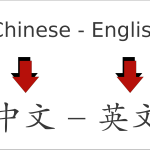Articles in the ‘Intermediate’ category Page 21
-
How to become a Chinese-English translator and what it’s like to be one
This is an interview with Carl Gene Fordham about how to become a Chinese-English translator and what it’s like to work as one. The questions were collected from readers and combined into this interview!
Read → -
10 ways of using games to learn and teach Chinese
Games are great for learning languages. Here are ten ways you can use games to learn or teach Chinese as a second language!
Read → -
A student’s guide to comprehension-based learning
In this third and final article, the focus is on how students can make their own learning comprehension-based, with or without a teacher. It draws from the principles and ideas of the previous articles and allows you to apply these to your own learning.
Read → -
The benefits of a comprehension-based approach for teaching and learning Chinese
Diane Neubauer continues her series of guest articles about comprehension-based approaches to teaching and learning Chinese. In this the second part, the focus is on principles and motivations for using a comprehension-based method. There’s also an overview of teaching practices that fall into this category.
Read → -
An introduction to comprehension-based Chinese teaching and learning
This guest article by Diane Neubauer introduces comprehensible input and what it can do for us as language learners and teachers. It’s the first part of a series of three articles, focusing on comprehension-based methods for learning and teaching.
Read → -
How to fake sounding like a native Chinese speaker
Have you ever wanted your Mandarin to sound more advanced than it is? In this guest article, David Moser tells us how to fake sounding like a native Chinese speaker. While tongue-in-cheek, some of the advice applies even if you’re after the real thing!
Read → -
Spaced repetition is not limited to flashcards
Spaced repetition is important for learning anything, but especially vocabulary in a foreign language like Chinese. However, there’s much more to spaced repetition than vocabulary flashcard apps! Even if you dislike such apps, make sure you incorporate spaced repetition in some other way.
Read → -
Looking up how to use words in Chinese the right way
Looking up how to express something in Chinese is not as easy as it looks. Assuming that a word, especially a verb, can be used the same way in Chinese as in your native language usually results in incorrect or awkward sentences. Stop assuming and look things up properly instead!
Read → -
Why you should preview before every Chinese lesson
Previewing before every lesson is extremely important, yet only a minority of students actually do it. By spending more time before the lesson, you learn more without necessarily spending more time, and you will feel better about it too.
Read → -
Three factors that decide how much Chinese you learn
Many things determine how much progress you make. This article is an overview of three factors you should always keep in mind when planning how to reach your goals. You need all three!
Read →









